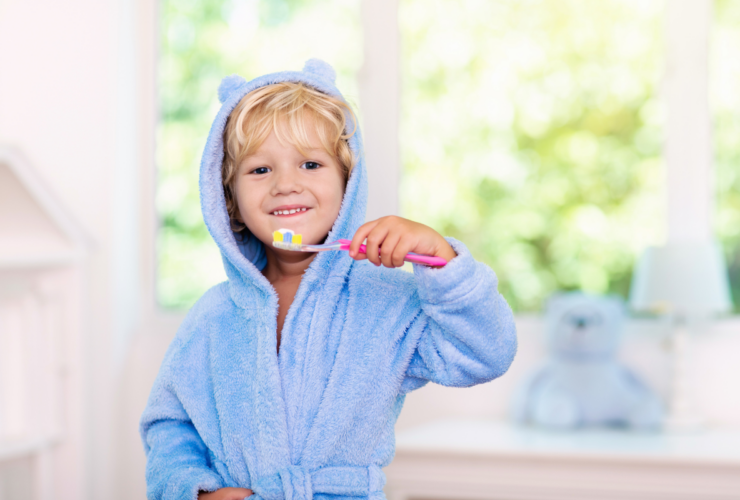Regular tooth brushing is important for both children and adults. If children are exposed to a high amount of sugary foods and drinks, they have a much higher risk of getting cavities or suffering from tooth decay.
It’s good for children to start having their teeth brushed early and regularly – visit the dentist for a check-up so that they won’t suffer from untreated dental decay that may otherwise go unnoticed.
We are often asked by parents how to brush a child’s teeth and whether or not they are doing enough to keep their child’s teeth healthy and clean. In this guide, we explain some of our top tips for brushing children’s teeth.
Choosing the Right Toothbrush
The toothbrush you choose must be designed for children with a small head and soft bristles. If your child doesn’t want to brush their teeth, it may help to allow them to choose their own toothbrush. You’d be surprised how much of a difference this can make!
A children’s electric toothbrush is also a good option for children over the age of three as this can make brushing much easier and exciting. You can also be sure that you’ll have an efficient clean, too!
Use the Right Amount of Toothpaste
Many patients make the mistake of using too much or too little toothpaste when brushing their child’s teeth. As a general rule of thumb, children under the age of 18 months should have no toothpaste – you should only be using water. Between 18 months and six years, you should only be using a pea-sized amount of children’s toothpaste, and make sure the toothpaste contains a low amount of fluoride.
From six years of age, you can then begin using a pea-sized amount of standard fluoride toothpaste. If you have any uncertainties about changing your toothpaste or whether you’re using the right toothpaste, we advise discussing it with your child’s dentist who can offer the best advice!
Allow Them to Try
At all ages, children are inquisitive and eager to learn. For this reason, giving them the opportunity to brush their teeth can really make brushing a fun experience and can help them to adopt this routine as they get older.
You may find it helpful to have two toothbrushes – one for you to brush, and one for your child to hold. You can then take turns to brush.
Of course, we wouldn’t recommend leaving the brushing completely to your child as you can be certain they will miss crucial steps. However, allowing them the chance to brush their own teeth can make brushing a fun task. You can then follow up afterwards to make sure all surfaces have been cleaned.
It’s crucial to continue supervising your child when brushing independently until you are confident they can do it well by themselves.
Brushing Techniques
Children tend to shy away from pain and discomfort. This means that if you attempt to brush their teeth and they feel any kind of discomfort at all, they’ll typically retreat away and can even refuse to have their teeth brushed in future.
This is why you should always brush gently in small circles. Clean every tooth thoroughly and allow them to spit out the toothpaste at the end. Try not to let them rinse with water afterwards, as this can remove the fluoride left behind that protects the teeth all day.
Making Brushing Fun
To encourage your child to enjoy brushing, you may wish to explore interactive apps or videos to help with timing. We recommend using the Brush DJ timer app, but you can also find plenty of other similar apps in your app store.
Another great way to ensure your child brushes for long enough is to buy a children’s electric toothbrush with a built-in timer. This makes it easy for them to keep track of the two minutes!
Use Reward Systems
Children thrive off of reward systems, regardless of their age. To encourage routine brushing, you can introduce a reward system appropriate to their age group with rewards relevant to them. Lots of parents prefer to create a reward chart to track progress and allow the child to see whether they are on track for receiving their reward.
For example, a reward for a full week/month of brushing could be pocket money, a meal at their favourite restaurant or a family day out! Incentivising your child is a great way to introduce them to proper tooth brushing!
Have Regular Dental Checks
Having regular dental check-ups are extremely important for children growing up. By the age of two, your child should have already visited a dentist for a check-up.
We advise talking to your dentist about the frequency of your visit as this may be more or less frequently than every six months.
The more frequently your child visits the dentist and from a younger age, even for just a check-up, the more likely they are to have a positive outlook on their oral health and visit the dentist. For this reason, we recommend taking your child to the dentist as early as you can, before they turn two.
Having regular dental checkups also allows your dentist to check the condition of your child’s teeth. It’s a great way for you and your child to see how well they are brushing their teeth!
Take Care of Your Child’s Teeth Today
At Hermes London Dental Clinic, we understand just how important it is to maintain oral health from a young age and to start as you mean to go on. Regular check-ups from a young age will ensure children won’t suffer from untreated dental decay with devastating effects on their growing dentition.
If you require a London dentist for children, please contact us on 020 7233 7660.
- GERD and Your Teeth: Why you should see a dentist urgently - November 24, 2024
- When a broken tooth is considered a dental emergency - November 24, 2024
- How to prevent tooth decay in children - July 9, 2024




